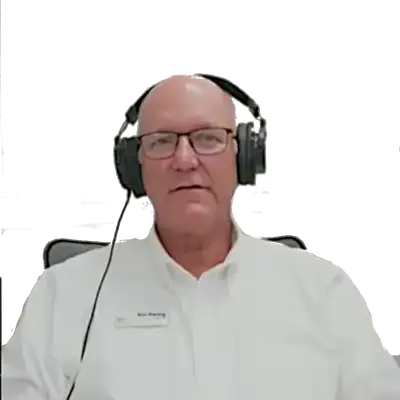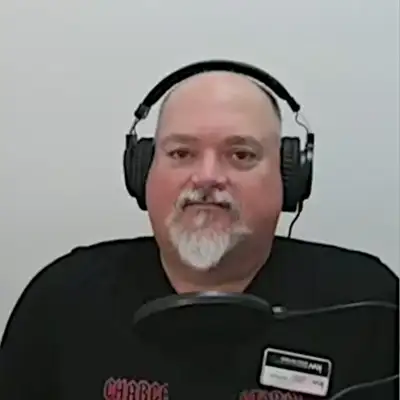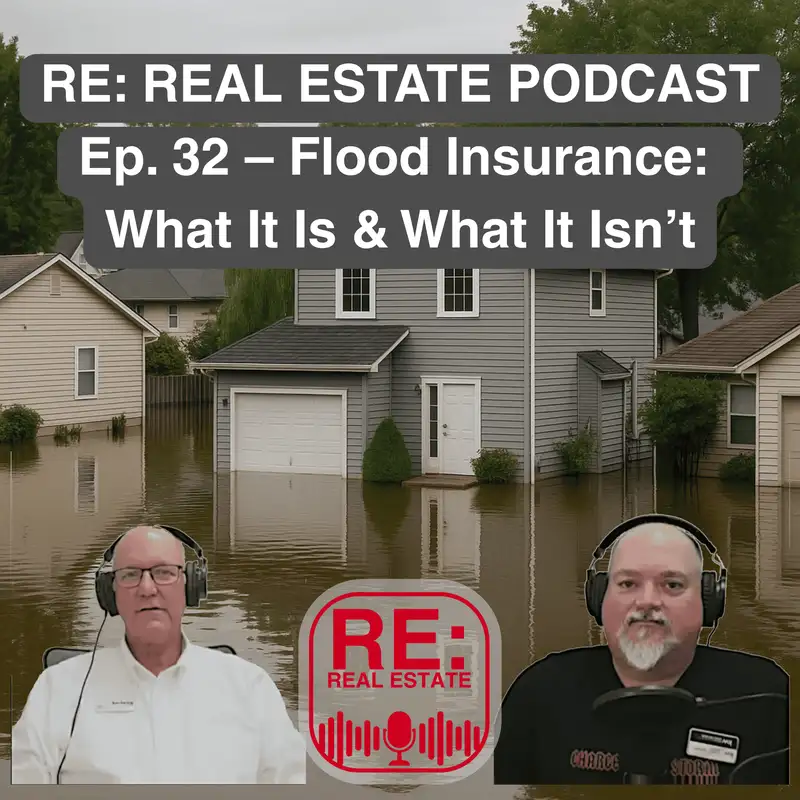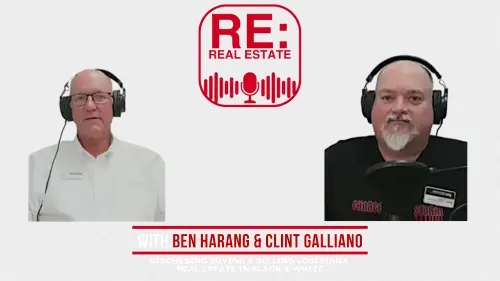Ep. 32 – Flood Insurance: What It Is & What It Isn’t
Ben Harang, Realtor® (00:31)
Hello everybody. Welcome to another episode of RE Real Estate Podcast. I'm Ben Harang with my cohost, Clint Galliano. Welcome to today's recording, to today's podcast episode, Clint. How's things going at Houma?
Clint C. Galliano, REALTOR® (00:46)
Things are going good. We're not raining. ⁓ It's a little warm, but it's not extremely hot. So we're doing all right.
Ben Harang, Realtor® (00:48)
That's a good thing.
That's good. That's good. All right. We, uh, we've been going back and forth about what we're to talk about today. Um, so I'm gonna let Clint, Clint, Clint tell you what we talking about. But before that, we usually say this for the end, Clint, and I'm gonna throw it in here. If you, if you get any value out of this, like, subscribe and comment on your podcast platform that you like, um, see if we can kind of grow the podcast a little bit. Cause I think we have some good content. Um,
And the more people that hears it, better. So, all right, Clint, what are we talking about today?
Clint C. Galliano, REALTOR® (01:31)
Alright, today we're talking about What Flood Zones Really Mean... and Don't Mean. So Ben, I got a question for you. When people are looking to buy a house, what's the most common thing we hear from?
Ben Harang, Realtor® (01:45)
It would go something like, do not want to buy a house in a flood zone.
Clint C. Galliano, REALTOR® (01:50)
Exactly. When the reality is, is that the whole United States is broken out into various flood zones. Everywhere is a flood zone. It's just what the severity of the risk for that flood zone is.
Ben Harang, Realtor® (02:04)
And what people really mean is they don't want to buy a house in a special flood hazard zone, which then requires them to buy flood insurance as a condition of a loan to buy the house. one really has nothing to do with what the chances of the house flooding are. some somebody somewhere in an ivory tower decided this house has a higher risk of flooding than that house.
that may or may not be based on science. So I'll leave that alone. Nothing we can do about that.
Anyway, right, right. And we're doing that. We're not doing that. We're here to give you information on how to buy and sell real estate in South Louisiana. And flood insurance is a big part of that. So that's what we're going to talk about today.
Clint C. Galliano, REALTOR® (02:36)
Yeah, that would be a whole other podcast episode and a lot of politics and we're not even gonna touch that with a 20 foot pole.
Yeah. So we've got the, depending on where you're located in our market, you could be looking at flood zone A, flood zone B, flood zone C or flood zone X. Currently Lafourche Parish is under that regime, ⁓ at least for the time being. If you're in Terrebonne Parish or St. Mary Parish,
Ben Harang, Realtor® (03:11)
Mm-hmm.
Clint C. Galliano, REALTOR® (03:17)
you're looking at flood zone AE, flood zone VE, V as in Victor, or flood zone X. And the reason for that is that St. Mary and Terrebonne have adopted newer FEMA flood maps. And at the moment, Lafourche has not had the opportunity to adopt the flood maps yet.
Ben Harang, Realtor® (03:42)
LaFouche has chosen not to and they're about to run out of chosen options and are going to be forced into accepting the new flood zones. And what happened in Terrebonne is a lot of the properties that historically were not required to buy flood insurance that were not in a special flood hazard risk zone were placed into a flood hazard risk zone. And a lot of people got letters from their lenders
has said, by the way, they changed the flood zone. So you're now required to buy flood insurance. And if you don't buy it, we will for you and charge you for it. so that was a, that was a surprise that nobody liked. and I suspect the same thing's going to happen in Lafourche. we have one buy a terrible one has five, so we might not be quite as bad.
But I know there'll be people that are surprised that today not in a special flood hazard zone and will be placed in it by the new maps.
Clint C. Galliano, REALTOR® (04:36)
Yeah, and based on the latest update.
there was some incorrectly filed paperwork on the side of the filer and not the parish. And there seems to be not a big push to get everything corrected at the moment. everything's kind of in limbo. Eventually it's going to come. And like Ben said, there's going to be people that currently
won't be required to have flood insurance for a loan that will be. But on the flip side, I know that there are gonna be some that currently are required to have flood insurance that won't have to have flood insurance going forward once the new maps are adopted. yeah, exactly.
Ben Harang, Realtor® (05:21)
Merry Christmas, that's you.
That's a big deal. So.
Clint C. Galliano, REALTOR® (05:26)
So
with the new maps, it's going to be just three flood zones. And they may be followed by a number and that's a designation for elevation. But the main things are AE, VE, and X. X is just a very little risk of flooding, or I should say what?
500 year floodplain. So once every 500 years.
Ben Harang, Realtor® (05:57)
It's it should it should it should flood
once every 500 years now Right, right, which is which is less than two-tenths of a percent or two-tenths of a percent annually I don't Nobody's around here in 500 years. So who knows what happens over 500 years, but we all are in South, Louisiana And I'm not going to be here 500 years from now
Clint C. Galliano, REALTOR® (06:01)
statistically.
And I wasn't here 500 years ago. Where you been?
So, yeah. AE is the most common one. That's the one that we see in the majority of our market, pretty much in Terrebonne. That's where most of the people that have moved to the flood zone A or in AE. ⁓ And VE is designated for the coastal areas. So it's...
Ben Harang, Realtor® (06:41)
Mm-hmm.
Clint C. Galliano, REALTOR® (06:49)
I guess slightly more chance of flooding than your AE flood zone.
Ben Harang, Realtor® (06:54)
Yeah, the
V seems to be more tidal driven from a tidal way from the Gulf. AE seems to be inland streams is kind of an easy non-scientific way to kind of categorize them, but either way you would need to buy flood insurance to obtain a federally backed loan on that property.
and, what happened, what happened to people that were in a non-special flood hazard zone, a lot did not have flood insurance. And then when they were required, they went straight to the actuarially sound rates, which are, I think exorbitant. The people that had a flood policy on their, on their house and got bumped into a special flood hazard.
zone were limited to an 18 % increase annually over time until it reaches that that actuarially sound rate. So it's there's a benefit to having a policy in place. There's a benefit to having that policy transferred when you buy the house because you have the same limitations when you buy that property and have that
flood policy transferred to you. I really don't care who pays the premium. The, the premium that that is currently on the policy. Cause that's insignificant compared to what it would be if you didn't have that, that policy. So if you're thinking about buying your house and you're not in a flood special flood hazard zone, and you don't have flood insurance, one of the things you might want to do is buy it. but then to do it now.
probably too late because it would go automatically to the higher rate. So that was for policies enforced before that. So scratch that idea, Clint. Yeah. Yes, it has. Yes, it has.
Clint C. Galliano, REALTOR® (08:43)
Yeah. Yeah, that was, that was getting ready to say that, that, that horses love to barn
So the premiums are, it's what Ben was meaning by actuarially sound is if you're buying from a private insurance carrier, then that's what the current National Flood Insurance Program insurance premiums, flood insurance premiums resemble.
Basically, they've kind of broken it up on what the cost is to implement the program and spread that out. And they have a black box calculation where they determine what the risk is of your home and charge you accordingly. And if you had a policy before they changed over to this new rating methodology, then they can't just automatically increase your premium.
and they raise it 18 % every year, plus add on fees and charges and stuff. So you're looking at 20, 23 % or so a year increases. But if you're buying a property that never had flood insurance, then you get hit with that full rate. And so that's driven a lot of people to say, nevermind.
Ben Harang, Realtor® (10:06)
Mm-hmm.
Clint C. Galliano, REALTOR® (10:06)
I
ran into that situation yesterday where homeowners policy for just regular homeowners insurance, is different, separate and apart from flood insurance because they cover different things and different risks. That was roughly about $3,900 on a $119,000 house. I spoke about it in last week's episode.
Ben Harang, Realtor® (10:17)
Mm-hmm.
Wow.
Mm-hmm.
Clint C. Galliano, REALTOR® (10:35)
and the flood insurance policy was about $3,900. And so this put the buyer who was looking at using an FHA loan to buy the house.
Ben Harang, Realtor® (10:39)
from seventy eight hundred dollars
Clint C. Galliano, REALTOR® (10:49)
she would wind up having to bring almost $20,000 to closing between closing costs and down payment to buy a $120,000 house. If she had that kind of money in her pocket, she could just as soon make a conventional loan and have a lot less worry.
Ben Harang, Realtor® (11:01)
Yeah, he CO2.
Right.
Well, and if you, said it was a VA buyer, ⁓ I'm sorry, FHA. Okay. I misunderstood. ⁓ because sometimes they have to, you have to bring that much money to the closing with a VA loan with no down payment and all that are just hard, all that's hard dollar cost. so flooding, flood insurance and flood zone is a big deal. Clint and I were talking before we started recording.
Clint C. Galliano, REALTOR® (11:16)
FHA.
Yeah.
Ben Harang, Realtor® (11:36)
If you're in an AE of VE zone, depending on a whole set of circumstances that I don't fully understand, there's a chance, depending on the elevation of the property, the elevation of the ground, what the base flood elevation is at that location to get what's referred to as a LOMA, which is a letter of map adjustment. And it will take a specific property.
out of a flood zone, out of a special hazard flood zone, and put it into a flood zone X, where you're not required to buy flood insurance. And at that point, you can buy the house without the flood insurance, or if you decide to buy the flood insurance, it is significantly less expensive in a flood zone X than it is in a flood zone AE or VE.
Clint C. Galliano, REALTOR® (12:27)
Actually,
since Risk Rating 2.0, Ben the examples that I've seen, there's not that much of a difference in the premiums. It may be $400 $500, but at the rates the premiums are, it's not really much of a discount.
Ben Harang, Realtor® (12:37)
OK. Bye.
Okay.
risk
rating 2.0, which they also can't tell us how they come up with the rates, which is frustrating, but it is what it is.
Clint C. Galliano, REALTOR® (12:57)
Yeah.
But I want to touch on the Loma process for a second. If you look at it on a map that shows where the special flood hazard area is for a property that has a Loma, it's basically the section where the home is considered flood zone X. It's like somebody drew a circle or square around the home.
Ben Harang, Realtor® (13:17)
Mm-hmm.
Clint C. Galliano, REALTOR® (13:24)
and it says this is flood zone X and then everything around it is flood zone AE.
Ben Harang, Realtor® (13:29)
Right. And also the mechanics of the house, in particular, the, I know the air conditioner, I'm not sure about a generator, but an air conditioner, if the house is high enough to be able to get the Loma, but the AC and heating unit outside is not high enough, you can't get the Loma until that unit is raised to the level of the house. So.
There's some work that may need to be done, but in the long run, it would be better off getting the Loma and getting out of the the special hazard flood insurance zone. And then you have the option of whether or not you want to buy flood insurance. And I'm not advocating that you do not buy flood insurance. I'm just advocating that there's some things that can be done to allow you to buy a house without being required to buy.
flood insurance.
Clint C. Galliano, REALTOR® (14:21)
And just an additional disclaimer, we're not insurance agents, we're not survey engineers, you know, so consult those to get the most correct answers. We're just only talking about experience that we have.
Ben Harang, Realtor® (14:32)
We just two good old boys selling. Yeah. ⁓
and, one more thing, I might get in trouble for saying this, but check with your insurance agent. if you're not in a flesh special flood hazard zone and you're not required to buy flood insurance and you decide to buy flood insurance, I don't think there's a requirement that you list your lender on the flood policy. So what that does in the event of a loss.
If you have the lender listed as a mortgagee, any loss proceeds check would be payable to you and the lender. And then they typically make you endorse the check over to them, they deposit it and dole the money back out to you as the repairs are made. That's a pain in the neck. If you don't have to list them, then that's between you and the insurance company.
when they write the check it's payable to you so you can go ahead and pay the bills and get your house fixed. So that's a little different twist that a lot of people don't really understand. But it can save you a lot of grief and a time of stress if your house does flood.
Clint C. Galliano, REALTOR® (15:38)
Yes, indeed. We saw a lot of people after IDA with just regular home insurance, homeowners insurance, that they couldn't do anything because they were waiting for weeks on end for their lender to sign off and dole money out to them to pay contractors.
Ben Harang, Realtor® (15:52)
Right.
And, and lenders are not set up to have being inundated with something like that. If there's a fire loss and it's one, it's a one-off, somebody can get a signature and get the money back to you pretty quick. You know, a catastrophe with multiple claims, their personnel are overwhelmed. and then people get scared to make a decision in the, on the lending side to sign off on the checks. so it's just, it's a nightmare.
So if you if you buy flood insurance and you're not required to You know a lot of age a lot of insurance agents so just just add the same mortgagee to the flood policy and You don't want them to do that if you know if you know An X flood zone, so just talk to them about it
Clint C. Galliano, REALTOR® (16:23)
him.
Yeah. So one thing I wanted to cover is just the risk. You can go down your street and have different levels of risk. There's a street in Raceland that various parts of the street, and this is in Lafourche Parish, jumps between flood zone C and flood zone A.
Ben Harang, Realtor® (16:54)
Mm-hmm.
Mm-hmm.
Clint C. Galliano, REALTOR® (17:00)
And what's even funnier is that with the proposed new maps, it's going to flop to flood zone X and flood zone AE. And those are in different areas. So what's currently flood zone A, some parts of those are going to become X and what's currently flood zone C is going to become AE. Not all the same, but it's, you know, it kind of just flip flops back and forth as you go down the street.
Ben Harang, Realtor® (17:11)
Mm-hmm.
Mm-hmm.
Right. And in the way the maps are drawn, you have to have a very good knowledge of where intersections are and trying to figure out exactly where that flood line is drawn. Because it could pass partially through the lot, but not the house, or it could cut straight through the house. And if any of the houses in that AE flood zone or A or V, depending on which parish you're in.
whole house is required to buy flood insurance. have to buy it on the whole house. You can make an argument if it cuts through the lot but not the house.
Clint C. Galliano, REALTOR® (18:04)
And an example of that is my townhouse in Natchitoches. The line for the flood zone cuts through the deck on the back of the house. And so the whole house is in a flood zone.
Ben Harang, Realtor® (18:14)
Mm-hmm.
Mm-hmm. So, so if somebody had a loan on that property, you'd have to buy flood insurance on it to get the loan. And Clint alluded to it earlier, but I just want to point it out. If you, if you borrow money on on a, on a property to buy it, you're required to buy a homeowner's policy and a flood policy if you're in a special flood hazard zone. The homeowners covers things like windstorm hail and fire.
Clint C. Galliano, REALTOR® (18:26)
Yep.
Ben Harang, Realtor® (18:45)
Uh, some theft coverage, but I'm not an insurance agent. So I'm not going to get into all the details, but it specifically excludes any loss by flooding or rising water. Um, and that's what the flood policy covers loss by rising water. Um, so you need, you need both of them. A lot of people before Ida didn't understand the difference, especially those that were not in the flood zone and were not required to buy flood insurance. They went for a rude awakening because they
They just assumed, I guess, that flooding was covered under their homeowners policy because they never had to have a conversation about flood insurance. So just educate yourself, talk to your insurance agent, and just do what's right for you.
Clint C. Galliano, REALTOR® (19:30)
I think we've done a good job of covering this. I'd say to the best of our ability, we covered a lot of common questions we get, explained a lot of misconceptions that we run across with clients day in and day out. Is there anything that we missed with regards to flood insurance?
Ben Harang, Realtor® (19:40)
Mm-hmm.
I don't think that, and again, this is just two good old boys in South Louisiana that help people buy and sell real estate every day based on our experience. We're licensed real estate agents, not licensed insurance agents, not engineers, not attorneys. We're not your agent. And like Clint says, unless we have paperwork to the contrary. So this is just information for you to use. Don't make any lifelong decisions based on it. Let's talk.
contact Clint, contact myself, talk to your insurance agent, if you're already in a house and, just do what's right for you.
Clint C. Galliano, REALTOR® (20:22)
All right.
All right, Ben, it's been fun.
Ben Harang, Realtor® (20:23)
Alright Clint,
it's been real fun. Alright another one's done. Y'all have a good day.
Clint C. Galliano, REALTOR® (20:30)
Alright man, have a good one.
Creators and Guests



